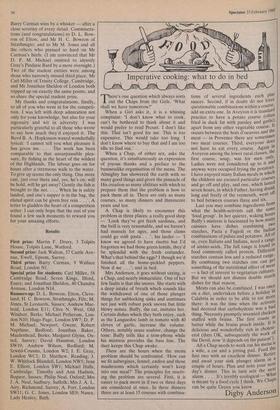Imperative cooking: what to do in bed
rr here's one question which always sorts 1 out the Chaps from the Girls. 'What shall we have tomorrow?'
When a Girl asks it, it is a whining complaint: 'I don't know what to cook, can't be bothered to think about it and would prefer to read Proust. I don't like this. That isn't good for me. This is too expensive. This would take too long. I don't know where to buy that and I am too idle to find out.'
When a Chap, of either sex, asks the question, it's simultaneously an expression of joyous thanks and a preface to the businesslike organisation of the menu. The Almighty has showered the earth with so many good things and given the pinnacle of His creation so many abilities with which to prepare them that the problem is how to pack them all in. There are only so many courses, so many dinners and threescore years and ten.
A Chap is likely to encounter this problem in three places: a really good shop — 'Look they've got fresh sardines, and the brill is very reasonable, and we haven't had mussels for ages, and those clams could go with pasta . . .'; his larder — 'I know we agreed to have risotto but I'd forgotten we had those green lentils, they'd be splendid with the fresh coriander. What's that behind the eggs? I though we'd finished all the home-pickled peppers. Now if we . . .'; and in bed.
Mrs Anderson, it goes without saying, is a Chap, and nearly immaculate. One of her few faults is that she snores. She starts with a deep intake of breath which sounds like the withdrawal of one of those plunger things for unblocking sinks and continues not just with robust pork snores but little blowy noises. Buffy, the cat, imitates her. Certain dishes which they both enjoy, such as the Languedoc lamb in tomato with 40 cloves of garlic, increase the volume. Others, notably sauce soubise, change the tone: Buffy trills like a trim-phone while his mistress provides the bass line. The duet keeps this Chap awake.
These are the hours when the menu problem should be confronted. How can we fit aubergines, fennel, endive and those mushrooms which certainly won't keep into one meal?' The principles for resolv- ing the problem are several. First, it is easier to pack more in if two or three days are considered at once. In three dinners there are at least 15 courses with combina- tions of several ingredients each plus sauces. Second, if in doubt do not force questionable combinations within a course, add an extra one. In Aveyron it is standard practice to have a potato course (often fried in duck fat with parsley and garlic) apart from any other vegetable course. It occurs between the hors d'oeuvres and the meat — in Provence there are sometimes two meat courses. Third, everyone does not have to eat every course. Again in Aveyron among the lower rural classes, the first course, sour, was for men only. Ladies were not considered up to it and anyway were occupied frying the potatoes. I have enjoyed many Italian meals in which the children are excused particular courses and go off and play, and one, which lasted seven hours, in which Father, having drunk long and freely of the vermouth, went off to bed between courses three and six. ' Last you may combine ingredients from what the health-activists call the same `food group'. In her quieter, waking hours Buffy's mistress is fascinated by how many cuisines have dishes combining two starches, Pasta e Fagioli or the Indian combinations of pulses and potatoes. All of us, even Italians and Indians, need a range of amino-acids. The full range is found in food commonly called protein. Different starches contain less and a reduced range. By combining two starches one can get something of the nutritional effect of meat a fact of interest to vegetarian cultures. But we should not dismiss double starch dishes for that reason.
Meats can also be combined. I was once on a diet, undertaken before a holiday in Calabria in order to be able to eat more there: it was the time when the activists had decreed that carbohydrate was a bad thing. Necessity promptly invented chicken stuffed with brains. The first roasts in butter while the brains poach inside. It is delicious and wonderfully rich in cholest- erol (then OK, subsequently the work of the Devil, now 'it depends on the patient). All a Chap needs to work out his menu is a wife, a cat and a jotting pad. Feed the first two with an excellent dinner. Retire and await your sink plunger alarm in a couple of hours. Plan and note your next day's dinner. This in turn sets the next alarm . . . . It's terribly ecological — What is meant by a food cycle I think. We Chaps can be quite Green you know.
Digby Anderson










































 Previous page
Previous page